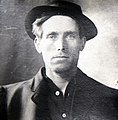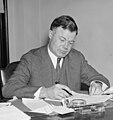Portal:Organised_Labour
Portal:Organized Labour


- In trade unions, workers campaign for higher wages, better working conditions and fair treatment from their employers, and through the implementation of labour laws, from their governments. They do this through collective bargaining, sectoral bargaining, and when needed, strike action. In some countries, co-determination gives representatives of workers seats on the board of directors of their employers.
- Political parties representing the interests of workers campaign for labour rights, social security and the welfare state. They are usually called a labour party (in English-speaking countries), a social democratic party (in Germanic countries), a socialist party (in Romance countries), or sometimes a workers' party.
- Though historically less prominent, the cooperative movement campaigns to replace capitalist ownership of the economy with worker cooperatives, consumer cooperatives, and other types of cooperative ownership. This is related to the concept of economic democracy.
The labour movement developed as a response to capitalism and the Industrial Revolution of the late 18th and early 19th centuries, at about the same time as socialism. The early goals of the movement were the right to unionise, the right to vote, democracy and the 40-hour week. As these were achieved in many of the advanced economies of western Europe and north America in the early decades of the 20th century, the labour movement expanded to issues of welfare and social insurance, wealth distribution and income distribution, public services like health care and education, social housing and common ownership. (Full article...)
The National Education Association (NEA) is the largest labor union in the United States. It represents public school teachers and other support personnel, faculty and staffers at colleges and universities, retired educators, and college students preparing to become teachers. The NEA has just under 3 million members and is headquartered in Washington, D.C. The NEA had a budget of more than $341 million for the 2012–2013 fiscal year. Becky Pringle is the NEA's current president.
During the early 20th century, the National Education Association was among the leading progressive advocates of establishing a United States Department of Education.
Driven by pressure from teacher organizing, by the 1970s the NEA transformed from an education advocacy organization to a rank-and-file union. In the decades since, the association has continued to represent organized teachers and other school workers in collective bargaining and to lobby for progressive education policy. The NEA's political agenda frequently brings it into conflict with conservative interest groups. State affiliates of the NEA regularly lobby state legislators for funding, seek to influence education policy, and file legal actions. (Full article...)Significant dates in labour history.
- April 01 - Burston Strike School began in 1914 the U.K.; the 1972 Major League Baseball strike began in the U.S. and Canada; the 1980 New York City transit strike began; the U.S. Supreme Court decided NLRB v. Truck Drivers Local 449; the Federation of Unions of South Africa was founded; the Allied Pilots Association was founded; the Loray Mill strike began in the U.S. in 1929; Sol Chick Chaikin died
- April 02 - Weldon Mathis was born; Eugene Hanley was born; the 1994–95 Major League Baseball strike ended in 1995
- April 03 - Percy Wells died
- April 04 - The On-to-Ottawa Trek began in Canada in 1935; William Quesse was born; the 2006 Minor League Baseball umpire strike began in the U.S.
- April 06 - Rose Schneiderman was born; the 1905 Chicago Teamsters' strike began as the Teamsters engaged in a sympathy strike; B. T. Ranadive died
- April 07 - The U.S. Supreme Court decided Lochner v. New York; Basawon Singh (Sinha) died
- April 08 - The 1998 Australian waterfront dispute began
- April 09 - John H. Dent died; the U.S. Supreme Court decided Adkins v. Children's Hospital and Bunting v. Oregon; Chris Watson was born; President Harry S. Truman nationalizes all steel mills in anticipation of the 1952 steel strike; Natascha Engel was born; Thomas Jackson was born
- April 10 - Harold J. Gibbons was born; Dolores Huerta was born; Joseph Diescho was born; George Lippard was born; Edward J. Carlough was born; Lee Batchelor was born; Anna Walentynowicz died
- April 11 - The 1980 New York City transit strike ended
- April 12 - Tom Addison was born; the U.S. Supreme Court decided NLRB v. Jones & Laughlin Steel Corp.; the Auto-Lite strike began in 1934 in the U.S.; the Union Label Department, AFL–CIO was founded; the Memphis sanitation strike ended; the Queensland Council of Unions was founded; the Sons of Vulcan was founded
- April 13 - Henk Sneevliet died; the Laborers' International Union of North America was founded
- April 14 - Dorothy Jacobs Bellanca was born; Marvin Miller was born; Ernest Bevin died
- April 15 - A. Philip Randolph was born; Pablo Manlapit died; the American Federation of Teachers was founded; "Black Friday" occurred in 1921 in the U.K.; Aleksei Gastev died; the Trade Unions Forum was founded; Margaretta Scott was born
- April 16 - Joseph Havelock Wilson died
- April 17 - Manwel Dimech died
- April 18 - Joseph Labadie was born; R. J. Thomas died
- April 20 - Gro Harlem Brundtland was born; The Ludlow Massacre occurred in 1914 in the U.S.; the International Harvester strike of 1979–80 ended
- April 21 - The Bituminous coal miners' strike of 1894 began in the U.S.; the First Employment Contract is repealed in France in 2006
- April 22 - Frederick Nicholas Zihlman died
- April 23 - Russell Crowell was born; the Canadian Labour Congress was formed; Cesar Chavez died; the Hock Lee bus riots occurred in 1955 in Singapore; Edward Lamb was born
- April 25 - Arnold Miller was born
- April 26 - United Trade Union Centre (Lanin Sarani) was founded
- April 28 - Workers' Memorial Day; Roy Lee Williams died; Bob White was born; Greg Combet was born; Jerry Horan died; Joseph Glimco died
- April 29 - The Coeur d'Alene miners' dispute of 1899 occurred in the U.S.
- ... that Amazon Labor Union founder Chris Smalls was one of the leaders in the first successful effort to unionize Amazon warehouse workers in the United States?
- ... that the 1913 Studebaker strike is regarded as the first major labor strike in the automotive industry?
- ... that the 56-foot-tall (17 m) monument to the theologian Samuel Rutherford near his parish church in Anwoth was badly damaged by a lightning strike five years after its construction?
- ... that during the 1913 El Paso smelters' strike the Industrial Workers of the World and the Western Federation of Miners competed to organize the strikers with their respective labor unions?
- ... that the Women's National Basketball Players Association was the first trade union for professional women athletes?
- ... that up to 129,000 Canadian federal workers went on strike?
In spite of oppressors, in spite of false leaders, in spite of labor's own lack of understanding of its needs, the cause of the worker continues onward. Slowly his hours are shortened, giving him leisure to read and to think. Slowly his standard of living rises to include some of the good and beautiful things of the world. Slowly the cause of his children becomes the cause of all. His boy is taken from the breaker, his girl from the mill. Slowly those who create the wealth of the world are permitted to share it. The future is in labor's strong, rough hands." |
— Mary Harris Jones. |
- ...that during the Hardin County onion pickers strike in 1934, anti-union vigilantes seized control of the town of McGuffey, Ohio, for a day?
- ...that partly because of issues highlighed by the London matchgirls strike of 1888, the Salvation Army opened up its own match factory in Bow, London in 1891, which used harmless red phosphorus and paid better wages?
- ...that in 1918, the National Federation of Federal Employees became the first labor union in the United States to win the legal right to represent federal employees?
The following Wikimedia Foundation sister projects provide more on this subject:
-
Commons
Free media repository -
Wikibooks
Free textbooks and manuals -
Wikidata
Free knowledge base -
Wikinews
Free-content news -
Wikiquote
Collection of quotations -
Wikisource
Free-content library -
Wikiversity
Free learning tools -
Wiktionary
Dictionary and thesaurus














































































